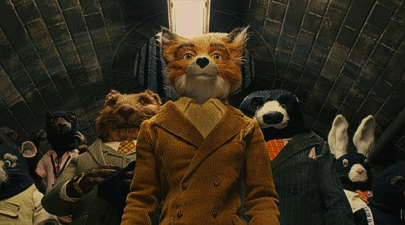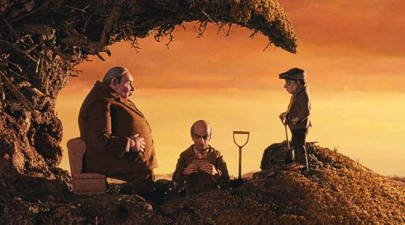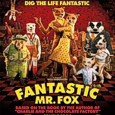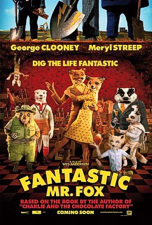Despite the aggravated proclamations of its animators and heavily dropped rumors that director Wes Anderson was hardly to be seen on the “set” of his latest film, a stop-motion animated adaptation of Roald Dahl’s Fantastic Mr Fox, there is, ultimately, no question whose film this most certainly is when regarding the final result. Anderson says he “lived” the production for two years, and it’s clear he certainly supervised the vocal recordings, but while his thumbprints may not show up on the characters’ animation itself, his fingers are all over the rest of the movie, from its visual design to the music and editing.
 Over a long career that has only yielded a handful of films (Mr Fox is only Anderson’s sixth film in fifteen years), I can’t say that each and every one has made its mark on me. His debut, Bottle Rocket, didn’t take off for me, despite the pairing of the Owen brothers and their off and on-screen collaboration on the film. Rushmore, the first of which one might recognize as an Anderson movie, had a fine and quirkily funny central conceit, but Jason Schwartzman’s character was too distant to ever really connect with and the film was more notable for finally outing Bill Murray as an actor of note.
Over a long career that has only yielded a handful of films (Mr Fox is only Anderson’s sixth film in fifteen years), I can’t say that each and every one has made its mark on me. His debut, Bottle Rocket, didn’t take off for me, despite the pairing of the Owen brothers and their off and on-screen collaboration on the film. Rushmore, the first of which one might recognize as an Anderson movie, had a fine and quirkily funny central conceit, but Jason Schwartzman’s character was too distant to ever really connect with and the film was more notable for finally outing Bill Murray as an actor of note.
Anderson’s next, The Royal Tennenbaums, was a bull’s eye hit, and his tale of an extended family with labyrinthine issues was rewarded with very good notices and decent box office, boosted by writing that was strong and focused, and an amazing line-up of names in a powerhouse cast that included Gene Hackman in one of his more significant final roles. The family unit dynamic was a major element of The Life Aquatic With Steve Zissou, in which Murray played a Cousteau-like documentarian out for somewhat subdued revenge against the shark that ate his filmmaker partner.
The underwater scenes were notable for featuring the stop-motion creatures of Henry Selick, bringing a fantasist angle to another idiosyncratic story, and though the film didn’t appeal to everyone, it is perhaps my favorite of Anderson’s live-action work, the poorly received The Darjeeling Limited from two years ago proving to be a little too complacent even for long-time followers. Selick was also in the frame to direct Fantastic Mr Fox (having also directed a much-praised adaptation of Dahl’s James And The Giant Peach), although it was perhaps a combination of the time it took the project to come together and, possibly, Anderson’s insistent nature that caused him to drop out and pursue the more personal Coraline instead.
Anderson resisted the temptation to go for computer animation and retained Selick’s medium of choice, stop-motion, shooting the film just outside London at the Three Mills Studios, with much of the same crew as worked there on Tim Burton’s Corpse Bride. Given these British connections, not least Dahl’s original story, there’s a distinct Brit-feel to Mr Fox, despite the mix of voices. Various Anderson regulars, joined by a top-lining George Clooney and an unrecoginzable Meryl Streep as Mr and Mrs Fox respectively, fill the roles, with a returning Schwartzman especially good as their distant son. Of course, the villains, a trio of farmers out to catch Mr Fox and stop his raiding and looting, are English, led by Michael Gambon, here forgoing the soft tones of Professor Dumbledore and playing up his unhinged wide boy criminal type as seen recently in Layer Cake and the underrated comedy High Heels And Low Lifes.
 Gambon is one of the most realistic villains in recent animated film, losing an early comic slant to become truly ruthless and the somewhat terrifying ringleader of the farmers; his destroying of his office at a point of frustration is unexpected and a great bit of animation. But regardless of the mixed accents, Mr Fox works in that way that didn’t affect the likes of The Jungle Book, or The Lion King, where many dialects all seemed to be able to coexist in far off continents, and although a particular setting is never specifically mentioned, Mr Fox’s impressive sets and almost “knitted fields” indicates that we’re still firmly in the English countryside. If the film comes close to anything, it’s the feel of Aardman Animation’s Chicken Run, which apart from the medium, Mr Fox seems to share a lot with in tone.
Gambon is one of the most realistic villains in recent animated film, losing an early comic slant to become truly ruthless and the somewhat terrifying ringleader of the farmers; his destroying of his office at a point of frustration is unexpected and a great bit of animation. But regardless of the mixed accents, Mr Fox works in that way that didn’t affect the likes of The Jungle Book, or The Lion King, where many dialects all seemed to be able to coexist in far off continents, and although a particular setting is never specifically mentioned, Mr Fox’s impressive sets and almost “knitted fields” indicates that we’re still firmly in the English countryside. If the film comes close to anything, it’s the feel of Aardman Animation’s Chicken Run, which apart from the medium, Mr Fox seems to share a lot with in tone.
So here, instead of Mel Gibson’s plucky rooster, we have Clooney’s wiley Mr Fox, shooting out dialogue like James Cagney. He heads up another noteworthy Anderson ensemble that also includes Owen Wilson, and, inevitably, Bill Murray, all of whom never steal the show away from their characters and all of which, remarkably for a celebrity cast, fit their personalities like a tailored glove. There are opportunities for clever language and witty wordplay, but this only ever gets near the mark (“We’ll shoot the cuss!”) and never crosses any lines that tips it into adult territory. That the cast are also often asked to relay sometimes quite banal and everyday dialogue, delivered with speed and gusto, is exactly what makes Fantastic Mr Fox both down to Earth, but wonderfully different from other animated pictures – especially the cut and paste antics of many shiny CG films – at the same time.
Another element towards this reaction is the truly handcrafted nature of the models and animation. While everything is super-slick and fluidly animated, there’s a slight art-house European animation sensibility to the characters, their clothing ruffled around by the animators’ hands, though giving the foxes the constant appearance of wind blowing through their fur. This brings a stylized but highly naturalistic look to the production, especially the human figures, and even though the animals routinely wear clothing and live in “houses”, they are clearly still animals, especially when they eat and when in accelerated motion, cleverly moving with fluid yet staccato actions that keep the characteristics between animal and man distinct.
These touches extend to the staging of the film, and here again Anderson’s visual ingenuity comes to the fore. Some of these tricks are old trademarks (the use of a book to highlight the main title, the typically direct and symmetrical framing, and the illustrated descriptions of setting plans into motion) and some of them are new slants: the side-section views of various locations, especially to depict the animals tunneling, which is somewhat odd in appearance and shouldn’t technically work, but has a innate charm to the process, as does the rest of this film – you may well have seen films that look like this, but you’ve never seen a film quite like this before.
 For me, the one weak link is Willem Dafoe as a security rat, a personality not as clever or witty as the film thinks he is, and the ultimate resolution of the character doesn’t have the impact that it should. But even here there seems to be some playing with other levels: like or loathe the character, it’s hard not to see the fun in the rat’s sharp teeth, reminiscent of Dafoe’s own role as Max Schreck in the account of filming Nosferatu, the deeply comical Shadow Of The Vampire, and furthering Dahl’s British influence is the wannabe singer Petey, voiced, and caricatured from, Pulp front man Jarvis Cocker. With a terrifically tactile feel, Fantastic Mr Fox is an immensely visual film, and like the best of Aardman, is fueled by wonderful details; a heist pulled off and seen via several closed circuit TV monitors will especially raise a chuckle, as will a supermarket ending, reminiscent of the final shot in Raiders Of The Lost Ark.
For me, the one weak link is Willem Dafoe as a security rat, a personality not as clever or witty as the film thinks he is, and the ultimate resolution of the character doesn’t have the impact that it should. But even here there seems to be some playing with other levels: like or loathe the character, it’s hard not to see the fun in the rat’s sharp teeth, reminiscent of Dafoe’s own role as Max Schreck in the account of filming Nosferatu, the deeply comical Shadow Of The Vampire, and furthering Dahl’s British influence is the wannabe singer Petey, voiced, and caricatured from, Pulp front man Jarvis Cocker. With a terrifically tactile feel, Fantastic Mr Fox is an immensely visual film, and like the best of Aardman, is fueled by wonderful details; a heist pulled off and seen via several closed circuit TV monitors will especially raise a chuckle, as will a supermarket ending, reminiscent of the final shot in Raiders Of The Lost Ark.
Adapted from Dahl’s original, the story has understandably undergone some tweaks and changes, but it truly retains more than just the gist. Despite the slick cast and exuberance from Clooney, it’s still the tale of a marauding chicken thief who raises the ire of three local farmers, one of which, Bean, manages to snaggle off Fox’s tail and wear it as a tie, leading to all out “animal” warfare! The scale of these scenes is impressive, even though the film retains a highly intimate feel (the Foxes’ detailed beech tree home being based on one in Dahl’s own grounds), especially in Mr and Mrs Fox’s relationship, and there are great moments in the writing, such as Fox’s self-realization that he can not continue the way he has been, and the use of language, such as a Latin name roll call that is supposed to call upon the animal’s primal instincts until one of them – Murray’s lawyer – suggests his talent is “demolitions expert”!
All of which adds up to a movie that may well split an audience right down the middle. It’s genuinely unique in the marketplace, which will either be rewarded by good word of mouth or come over as being too original and innovative for some audiences. Fantastic Mr Fox is unconventional, but it still delivers all the beats for mainstream commercial and critical success, and if the early Oscar buzz ends up being valid, I hope the film wins on its own merits and not because of live-action support from the cast’s friends. It even finds time for a selection of Anderson’s typically erratic music choices, including Burl Ives and, in a couple of nods to Disney, The Ballad Of Davy Crockett, hinting at a 1950s retro era, and Love from the Studio’s 1973 animal take on Robin Hood in which the hero was another foxy thief of course.
Not quite the animated Ocean’s… picture widely described by other reviewers due to the Clooney connection, Mr Fox is again Anderson’s film, akin to how a big, studio financed independent animated movie would turn out. That is essentially what has occurred here, along the lines of an animated Little Miss Sunshine, for instance, ironically another Fox release, and although our hero is truly a Twentieth Century Fox, the Studio’s logo does not undergo any opening shenanigans here: a missed opportunity or too obvious for a cheap gag?
Perhaps with animation’s new found status of worth – at last – we are entering a new phase where our most inventive live-action directors have become frustrated with those limitations and have a need to explore their imaginations in a new medium. Already we’ve had Tim Burton returning to his animation roots, and even Spike Jonze has dipped in similar waters with Where The Wild Things Are, which feels like something of a kindred project to Mr Fox. Not all these crossovers will be successful – for every Terry Gilliam professing an interest in visiting Pixar, which could be a new level for both indeed, we have once great directors and their doomed pursuit of motion-captured photorealism. I await with great interest the results of Pixar’s live-action epics 1906 and John Carter Of Mars, but in the meantime, as a director who has taken the trip in the opposite direction, and however hands on or off he may have been, Mr Fox is Wes Anderson’s film, and it is Fantastic!
20th Century Fox
2009
87 minutes
Rated PG
directed by Wes Anderson












